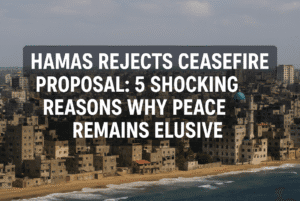Hamas Rejects Ceasefire Proposal: 5 Shocking Reasons Why Peace Remains Elusive
Hamas has rejected a recent Israeli ceasefire proposal, which demanded the group begin disarmament talks in exchange for phased hostage releases and limited humanitarian aid. Hamas views disarmament as a surrender of its core identity and insists on a full Israeli withdrawal, permanent ceasefire, and Gaza’s reconstruction. The proposal included releasing Israeli-American soldier Edan Alexander and other hostages for over 1,400 Palestinian prisoners.
As negotiations stall, Gaza faces a dire humanitarian crisis with widespread destruction, aid blockades, and over 51,000 reported deaths. Meanwhile, internal Israeli pressure mounts on Netanyahu to prioritize hostage recovery over prolonged conflict. Mediators from Egypt, Qatar, and the U.S. struggle to bridge irreconcilable demands. The deadlock underscores a deeper ideological clash—security versus resistance—that fuels continued bloodshed with no end in sight.

Hamas Rejects Ceasefire Proposal: 5 Shocking Reasons Why Peace Remains Elusive
The latest attempt to broker a truce in Gaza has hit a wall as Hamas firmly rejected an Israeli ceasefire proposal demanding the militant group discuss disarming—a condition it views as a non-starter. The impasse underscores the widening chasm between both sides’ priorities, with Israel insisting on long-term security guarantees and Hamas demanding an unconditional end to the war.
Israel’s Offer: A Path to Peace or a Strategic Gambit?
According to mediators familiar with the negotiations, Israel’s 45-day proposal outlined a phased approach:
- Hostage Releases: Hamas would free 10 living hostages, starting with Israeli-American soldier Edan Alexander, followed by additional releases in exchange for over 1,400 Palestinian prisoners, including those serving life sentences.
- Negotiation Timeline: Within six weeks, talks on Gaza’s future—including Hamas disarming—would begin. Only if a permanent ceasefire agreement were reached would remaining hostages be released.
- Humanitarian Concessions: Israel offered to ease its blockade on aid but proposed stricter controls to prevent Hamas from accessing supplies.
Hamas, however, dismissed the plan, reiterating that any deal must include a full Israeli withdrawal, reconstruction of Gaza, and an immediate, permanent ceasefire. A senior Hamas official anonymously emphasized that disarmament equates to “surrendering our resistance,” a core identity the group refuses to relinquish.
Humanitarian Crisis Looms Over Negotiations
As talks falter, Gaza’s 2.3 million residents face escalating deprivation. The UN reports that 90% of homes are damaged or destroyed, bakeries have shut due to flour shortages, and aid stocks are critically low. UN Secretary-General António Guterres condemned Israel’s aid restrictions, warning that proposed distribution mechanisms risk “limiting aid down to the last calorie.” Meanwhile, Gaza’s Health Ministry reports over 51,000 Palestinian deaths since October, though figures remain disputed internationally.
Internal Pressures Mount on Netanyahu
Domestic dissent is growing within Israel. Hundreds of military veterans, including elite units like Navy SEALs, have publicly urged Prime Minister Benjamin Netanyahu to prioritize hostage returns over prolonged warfare. Letters from reservists accuse the government of letting political interests overshadow national security, with some air force personnel facing dismissal for dissent.
Netanyahu, however, remains defiant. During a surprise visit to Gaza troops, he vowed to continue military pressure until “all objectives are achieved.” His far-right coalition’s push for Palestinian “voluntary migration” aligns with a controversial vision critics compare to ethnic displacement.
Mediators’ Dilemma: Bridging the Unbridgeable?
Egyptian and Qatari mediators, along with U.S. officials, face steep challenges. Hamas insists any truce must irrevocably end the war, while Israel seeks guarantees against future attacks—a circular demand that has stymied progress. The U.S. role, particularly in ensuring compliance, remains pivotal but untested.
The Road Ahead
The deadlock reflects irreconcilable red lines: Israel’s demand for security through Hamas’s demilitarization versus Hamas’s survival as a political and armed entity. With neither side willing to blink, civilians bear the brunt. As international calls for de-escalation grow louder, the question remains whether external pressure or battlefield realities will force compromise—or if the cycle of violence will persist, deepening Gaza’s humanitarian abyss.
Insightful Takeaway:
This stalemate isn’t merely about hostages or ceasefires—it’s a clash over existential futures. For Israel, disarming Hamas is a security imperative; for Hamas, retaining arms is a symbol of legitimacy. Until both sides confront these deeper tensions, temporary truces may only delay, rather than prevent, further bloodshed. The voices of Gazans and dissenting Israelis alike highlight a shared urgency: without bold political solutions, the war’s scars will endure for generations.
You must be logged in to post a comment.